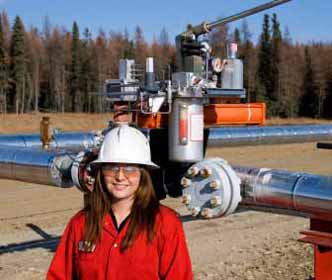Other Oil and Gas Jobs
Throughout the petroleum industry, there are many different kinds of jobs to be had. Some are very entry-level; some require significant education and training.
Here we have listed some, not all, of the common jobs found in the different sectors of the oil and gas industry. Additionally, there are many opportunities for people with abilities to maintain mechanical equipment, run heavy equipment, do basic construction work, welding, and a variety of other tasks of a similar nature. Companies also hire qualified project managers or project engineers and prefer those who have worked in the oil and gas arena before.
Pay for each of the jobs varies based on experience and level of education as well as where the job is located. For instance, if you’re put in a very remote location the pay may be higher or include bonuses or premiums for transportation or cost of living.

Exploration & Production
Petroleum Engineer
Quick Summary – Devises methods to improve oil and gas well production and determine the need for new or modified tool designs. Oversees drilling and offer technical advice to achieve economical and satisfactory progress.
Detailed Description: Petroleum Engineer Jobs
Geologist
Studies composition, structure, and history of the earth’s crust; examines rocks, minerals, and fossil remains to identify and determine the sequence of processes affecting the development of the earth; applies knowledge of chemistry, physics, biology, and mathematics to explain these phenomena and to help locate mineral and petroleum deposits and underground water resources; prepares geologic reports and maps; and interprets research data to recommend further action for study.
Geoscientist
Quick Summary – Studies the composition, structure, and other physical aspects of the earth. May use geological, physics, and mathematics knowledge in exploration for oil, gas, minerals, or underground water; or in waste disposal, land reclamation, or other environmental problems. May study the earth’s internal composition, atmospheres, oceans, and its magnetic, electrical, and gravitational forces. Includes mineralogists and seismologists.
Detailed Description: Geoscientist Jobs
Geological and Petroleum Technician
Assists scientists in the use of electrical, sonic, or nuclear measuring instruments in both laboratory and production activities to obtain data indicating potential sources of metallic ore, gas, or petroleum. Analyzes mud and drill cuttings. Charts pressure, temperature, and other characteristics of wells or bore holes. Investigates and collects information leading to the possible discovery of new oil fields.
Environmental Protection
Environmental Science and Protection Technician
Performs laboratory and field tests to monitor the environment and investigate sources of pollution, including those that affect health. Under direction of an environmental scientist or specialist, may collect samples of gases, soil, water, and other materials for testing and take corrective actions as assigned.
Safety
Health and Safety Engineer
Promotes worksite or product safety by applying knowledge of industrial processes, mechanics, chemistry, psychology, and industrial health and safety laws.
The U.S. government maintains a website where you can look up information on just about every kind of occupation. Go to https://online.onetcenter.org/find/ and search their database using keyworks like ‘pipe’ or ‘geologist’ to learn about a specific job.

